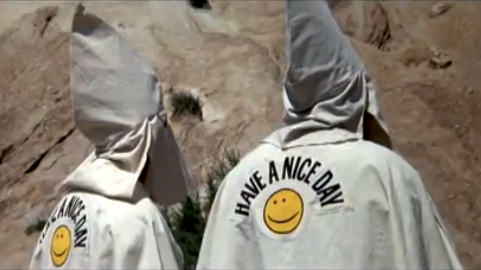Political Correctness Is Ruining Comedy is back in the news, because there are a lot of people who don’t understand that punching down has never been funny or acceptable. When that discussion turns to cinema, there are certain movies that people like to say could never get made today, and one of those is one of Mel Brooks’s 1974 hits, Blazine Saddles. (The other hit is Young Frankenstein, which, wow, what a year, Mel) This position is mostly a crock of shit, and I say mostly because there are a few things that would hold it back, but they’re almost certainly not the elements people are thinking of, i.e. the race humor.
While Blazing Saddles is a movie full of offensive and often tasteless content, it is not using these elements blindly. As with all good satire there’s a clarity of purpose, and despite an abundance of slurs (particularly the n-word), the film textually understands that those slurs are bad, mostly confining it to villains, or characters who eventually learn better and stop. (Besides, racist language certainly isn’t stopping any contemporary films from getting made, whether they know what they’re doing or not. Looking at you, Tarantino)
And unlike the waylaid HBO series Confederacy, Blazing Saddles doesn’t have an inherently offensive premise. Bart (Cleavon Little), a poor black worker (this is 1874, so we’re Post-Reconstruction) is appointed sheriff of a small frontier town thanks to the machinations of a greedy land developer, Hedy Lamarr [that’s Hedley!] (Harvey Korman), who believes his very presence will so outrage the simple townsfolk that they’ll pack up and leave the land and he’ll be able to run his railroad through it. However, he doesn’t count on Bart being resourceful and charming, earning the respect and admiration of the townspeople and ultimately leading them in a rebellion against Hedy’s [Hedley’s!] cronies.
Another significant facet of the film I am continually surprised people don’t realize is that Richard Pryor has a screenplay credit, and was at one point attached to star. The other 3 credited screenwriters are white, but Pryor’s power and influence (and controversy) in 1974 cannot be understated, and having him on board is a significant gesture in making sure there was authenticity and knowledge behind its humor involving race. (Obviously even with a black perspective it can still be controversial, but it’s also not just a bunch of white dudes straying way the hell out of their lane)
It’s also worth noting that there is a lot of offensive content in the film that has nothing to do with race. The campfire fart sequence was a major hot-button issue at the time, though such a gag is so ubiquitous now it’s difficult to imagine studio heads fretting over it. There’s also the famous scene where the mighty Mongo punches a horse in the face, which… violence against animals, I get it, but it’s so damn goofy it’s hard to be mad. The mincing stereotypes in the “French Mistake” part probably didn’t raise an eyebrow, but would get a ton of thinkpieces now. (Though it’s still hilarious that at one point during the fight that has spilled over onto its set, one of the cowboys and one of the dancers apparently decide they’re going to hook up)
So, what would keep Blazing Saddles from being made today? First and foremost I think the decades of shitty “spoof” movies would be a major hindrance on the kind of Borscht Belt silliness that is Mel Brooks’s stock-in-trade. This is a VERY silly movie, which I think a lot of people forget about and is a major factor in diffusing touchy subject matter. (This is a movie that lifts the old “bomb-in-a-Candygram” gag wholesale from Looney Tunes to dispatch of a bad guy.) Another thing… I honestly think the script would probably get noted to death. This is a movie that doesn’t really care about its plot beyond being a clothesline to hang all of its gags on, and I could see story gurus asking for character arcs and second act low points and all the stuff that can make a really tight screenplay, but are ultimately pointless speedbumps for the kind of kinetic anarchy the movie runs on.

